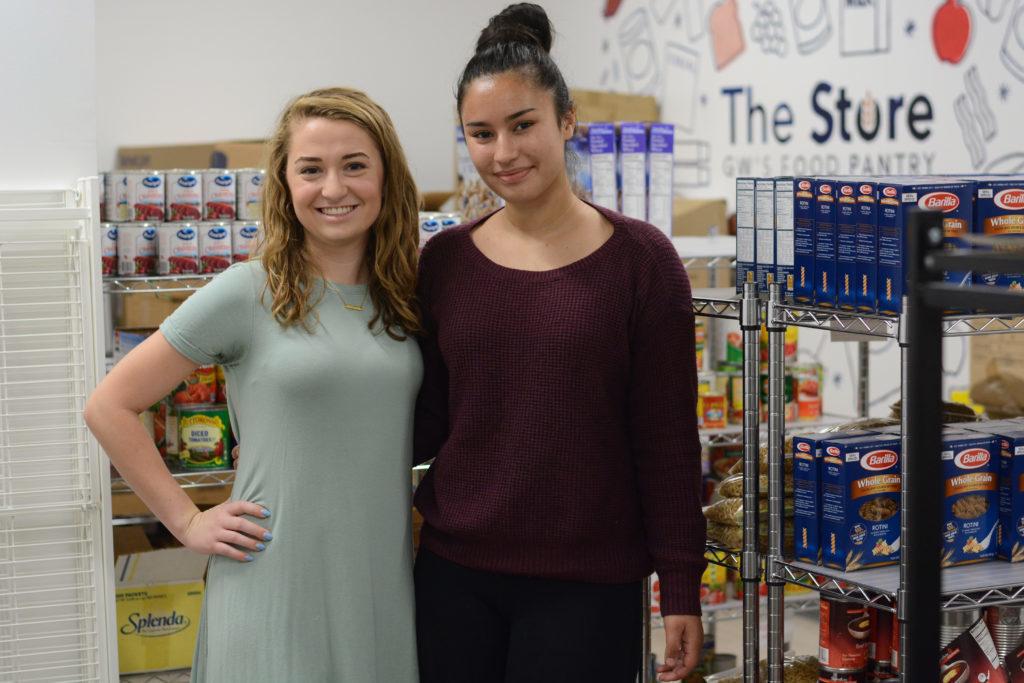Updated: Sept. 14, 2017 at 4:37 p.m.
GW’s food pantry is ramping up its fundraising efforts this year, hoping to raise enough money to keep its doors open for at least the next decade.
Now in its second year of operation – and first as a student organization – The Store is aiming to raise at least $100,000 for an endowment fund by the end of the academic year. The food pantry also added school supplies and business clothes to its inventory this fall in hopes of addressing affordability obstacles that go beyond having something to eat.
Tim Miller, the associate dean of students and adviser to The Store, said his “sole purpose” this academic year – after turning the day-to-day running of the pantry over to a student group – is to raise between $100,000 and $400,000 to create an endowment for the pantry, which would give 5 percent back each year to fund its daily operation.
“The money would always be there,” Miller said about the endowment fund. “That means that 60 years from now, when I’m absolutely not here, there’s still money funding The Store, or whatever needs to be funded based on what the need is for students.”
Miller said last year it cost about $10,000 to run the pantry, including about $6,000 for food and the rest for miscellaneous costs, like transportation.
“People didn’t know about it last year that needed it,” he said. “The more people we have, the more money we need.”
The Store has the money it needs to operate this academic year, Miller said, but he hopes to use additional donations to start the endowment fund. There is no formal fundraising campaign for the endowment and no money has been raised for the effort so far, he said.
The pantry launched last fall to address the growing problem of food insecurity on campus. GW joined several other universities who offer campus pantries to feed students who might otherwise be forced to skip meals and go hungry. The shelves are primarily stocked with food from the Capital Area Food Book.
The Store had about 650 users by the end of last spring and after a new registration period to start this academic year, more than 300 students signed up to use the pantry, Miller said. About a quarter of those users are students who didn’t go to the pantry last academic year and 36 percent are graduate students, he added.
As part of the stepped-up fundraising operation, Miller said an anonymous alumni donor committed to matching other outside donations up to an undisclosed amount to help fund the pantry this year. That campaign is not connected to the endowment fund. Miller said it is still ongoing and declined to say how much has been raised so far.
Two anonymous GW parents also gave a four-year donation to the University to cover the initial costs of food and food transportation to the pantry last year.
Students involved in the organization said the funding will propell the pantry as it branches out beyond food to offer other items deemed almost as essential for students – especially at GW.
The Store began featuring school supplies and business attire this fall to provide items students may need for the academic year but they won’t take priority over food, Sarah Sem, the president of the organization, said.
The organization advertised the two drives to staff and faculty in August, and collected items like notebooks, calculators, blank paper and sport coats. Although the campaign formally ended last month, the pantry has “never turned anything away,” Miller said.
“If you’re struggling to get food, there’s probably also other things that you need help with,” Sem said. “It’s really about being a resource for more than just one item for our community.”
Sem said the organization is also looking to acquire more kitchenware, like pots and pans, to address a less obvious aspect of food insecurity: being able to afford the supplies needed to prepare the food.
“We’re trying to help ease that issue so people can really focus on their basic needs without having it interfere with their education,” she said.
Saru Duckworth, the vice president of The Store, said the extra school supplies and clothing will help to level the playing field among students.
“At some schools, a blazer may not be a requirement or even very common, but I think at GW, which is so professionally motivated, it’s really necessary and useful,” she said. “We’re trying to find as many of those specific-to-GW things that students might need that aren’t really noticed in other places and fill those needs.”
The pantry is also expanding its outreach to potential new members through a new application, launching in the next few weeks.
James Harnett, a member of the student group running the pantry, said he began developing an app this summer to allow students to connect with the pantry anonymously, sign up for volunteer slots, get notifications when the pantry is restocked and get recipes and tips on how to budget effectively in an expensive city like D.C.
“This app provides a platform for us to reach out directly to shoppers in a way we never could before,” Harnett said. “We’re meeting people where they are, with engaging videos, useful recipes and timely updates.”





